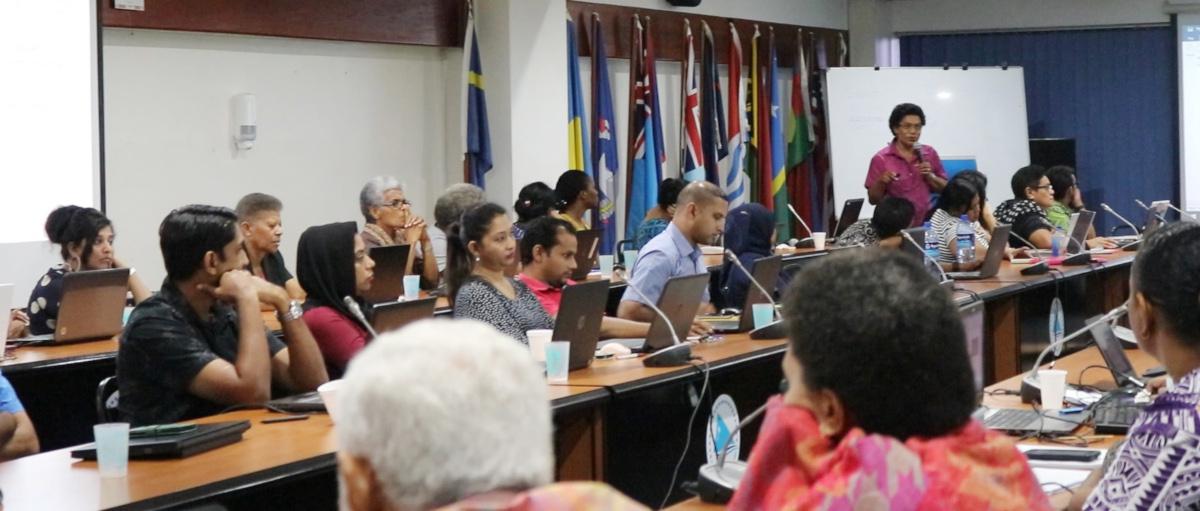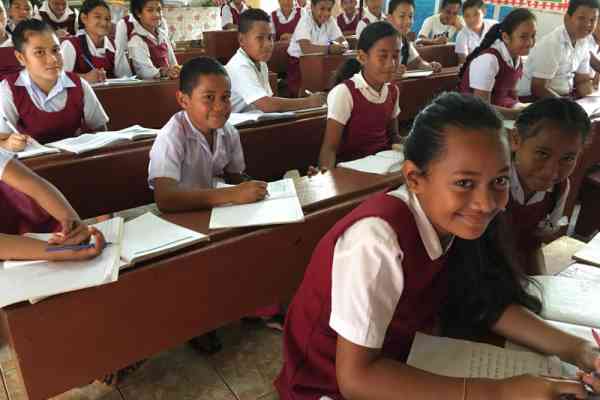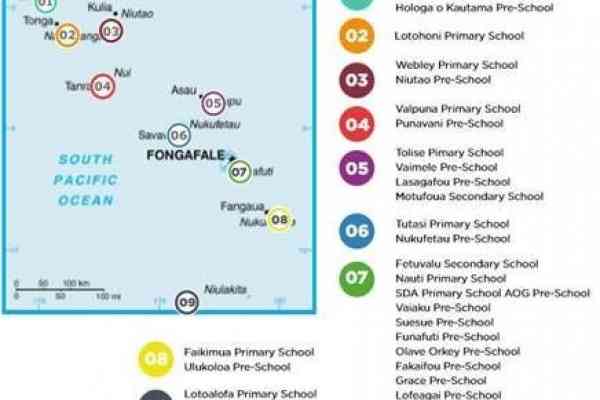Fullhouse at Pasifika Conference Room
The Pacific region’s first micro-qualification course in the development of assessment instruments was delivered by the Pacific Community’s Educational Quality and Assessment Programme (EQAP) last month.
The certified training, conducted over five weeks and inclusive of face-to-face sessions on three consecutive Saturdays, sets the pathway for the region’s educators who want to be qualified developers of examinations and internal assessments.
Of the 70-plus people who responded to the local call for expressions of interest in the micro-qualification, 59 applicants were accepted into the training. They included university lecturers and tutors, Ministry of Education staff, retired teachers, school leaders and practising teachers.
EQAP Team Leader (Curriculum and Assessment) Mere Vadei says developing assessment instruments requires a specialised skill set; something that is often not adequately addressed in teacher training programmes.
“This micro-qualification will address this gap and will equip teachers to better carry out their assessment role, whether this be in the classroom or at the national level,” she says.
The course is composed of three standard units, and each of these units had an assessment task that every participant was required to complete.
The training was led by Mrs Vadei, and was supported by two other educational assessment specialists, Geetanjali Lal and Doreen Tuala.
Mrs Vadei says the number of participants was more than her team anticipated. This points to the high demand within Fiji and other Pacific Community member countries for qualified assessment instrument developers. It also points to the presence of professional learning communities in our education systems who are keen to explore the development of future-oriented skill sets that are relevant for their practice now and in the future.
“Over the years, EQAP has been providing training on the development of assessment instruments to examiners, moderators and curriculum officers in response to requests received from countries,” says Mrs Vadei.
“In those sessions, participants were only awarded participation certificates with no comment on having met a particular assessment requirement. However, this micro-qualification course offers a recognised certification now.”
She adds, “This micro-qualification will ensure participants who have met the assessment requirements, and have therefore demonstrated the skills and knowledge, will be awarded a certificate as formal recognition of their achievement.
“(It) could also be a possible pathway for articulation into a full qualification in educational assessment,” says Mrs Vadei.
Fiji’s Ministry of Education’s Director of Curriculum Advisory Services Vimlesh Chand was one of the participants, and spoke highly of the training.
He says the training was a “rare and valuable opportunity to enhance my knowledge and skills in assessment”.
“While every single aspect of the training was very useful to me, I would consider the practical use and application of the SOLO* (Structure of the Observed Learning Outcome) taxonomy in assessment instruments development as the most beneficial,” he explains.
“The knowledge and skills from this training have a direct relevance to my role as the administrator of assessments at the Ministry of Education, Heritage and Arts.”
Mr Chand holds a leading role in managing the review, development, implementation, monitoring and evaluation of Fiji’s curriculum for early childhood, primary and secondary education.
He adds that the training is very relevant given the lack of qualified assessment specialists in Fiji and the region.
Another participant, Laisiasa Corerega, rates the quality of the training to be “beyond my expectations”.
“The programme has a graduate Level 7 qualification with 15 credit points. (i.e 1 credit = 10 hours),” he notes. “The programme also has three unit standards; Unit Standard 1 has three outcomes (with 5 credit points), Unit Standard 2 has four outcomes (with 6 credit points), and Unit Standard 3 has three outcomes (with 4 credit points).”
Mr Corerega, a management consultant with more than 13 years of teaching experience, adds that he especially appreciates that the assessment tasks could be completed any time during the week and emailed to facilitators.
Mr Corerega has served as a Fiji moderator and examiner for Design Technology exam papers. He says he is excited to be able to attain a micro-qualification for this skill set, and he hopes it will open new professional opportunities for him.
Mrs Vadei says participants who earn the micro-qualification** are potential examiners, moderators and scorers for national and regional assessments. This includes end-of-the-year examinations.
“As such, they are qualified to be contracted by national ministries of education for national examination purposes, or contracted by the Pacific Community for regional assessment purposes,” she says.
Historically, EQAP’s initial mandate when it was set up in 1980 (then known as the South Pacific Board for Educational Assessment, SPBEA) was to assist member countries develop assessment procedures towards national education certificates. In 2015, it became a programme of the Pacific Community and its mandate expanded to support quality education in the region. EQAP’s work is primarily funded by the Government of Australia and the New Zealand Government.
* SOLO taxonomy is a model of classifying learning outcomes in terms of their complexity. This system allows curriculum developers, teachers, moderators and examiners to assess students’ work in terms of its quality, and not solely on the quantity of accurate responses.
** A graduation ceremony for successful participants of the micro-qualification course is scheduled for later this month.


